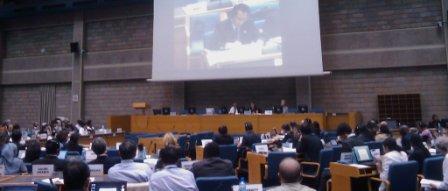First published on 05/31/2010, and last updated on 07/19/2022
Governance of protected areas and ICCAs (comprising indigenous peoples’ territories and areas conserved by indigenous peoples and local communities) featured centrally in the discussion of the Subsidiary Body on Scientific, Technical and Technological Advice (SBSTTA) of the Convention on Biological Diversity (CBD) held in May 2010 and are now importantly included in the recommendation to COP 10. IUCN CEESP in cooperation with the ICCA Consortium and UNEP/WCMC organized two well-attended side events at SBSTTA on these very topics.
After the 5th World Parks Congress (Durban, 2003) brought governance issues to the attention of the international conservation community, the CBD Programme of Work on Protected Areas (PoWPA) made crucial breakthroughs in recommending to its Parties the inclusion of various governance types in their protected area system, as well as the adoption of various good governance principles – such as participation, equity, transparency and accountability – in the conduct of each PA. One of the CEESP side event reviewed national and regional implementation of these aspects of the PoWPA, now also reflected in the global protected area database of UNEP WCMC. The event also introduced a PA governance tool kit—currently under development by CEESP members – which will help the Parties improve their compliance with PoWPA element 2 – the least advanced so far!
Overall, governance has become a buzzword for PoWPA and was particularly highlighted in the IUCN Plenary statement. One of the SBSTTA highlights for many of its participants was the keynote paper by Dr. Lovejoy, where many depressing indicators of the biodiversity demise in our planet were coupled with only one positive indicator: the increasing coverage of protected areas worldwide. Least we deduce that PA coverage is irrelevant for biodiversity, we need to include into the picture the concept of PA governance. Only effectively managed and well and diversely governed PAs may indeed help reverse negative biodiversity trends. As stated in SBSTTA recommendations to COP 10, Parties are invited to “…assess governance of protected areas… and conduct capacity building activities for protected area institutions and relevant stakeholders on implementation of element 2, and especially on governance aspects of protected areas”. The CEESP kit will indeed be used!
A main merit of the new understanding of PA governance has been the highlighting of ICCAs — a phenomenon of global significance for the earth’s biodiversity, for livelihood security and for cultural diversity. Both the IUCN and CBD stress the need to better understand, recognize and support ICCAs, and the second CEESP side-event at SBSTTA reviewed progress and provided key lessons learned and DOs and DON’Ts for that. The event also introduced new tools, such as the dedicated ICCA Registry of UNEP WCMC and the Bio-cultural protocols that can protect the traditional knowledge and customary rights of the indigenous peoples and local communities – sedentary and mobile – that govern ICCAs. Hot from the press, CEESP Briefing Note 10 was distributed in three languages (entitled “Strengthening What Works— Recognising and supporting the conservation achievements of indigenous peoples and local communities”, the publication can be downloaded from the ICCA FORUM publication page).
Indeed, ICCAs gathered much attention in Nairobi but is this fact only and entirely positive? ICCA advocates were both elated and worried. Plenty of examples already exist of governments that damaged their precious and unique ICCAs in the attempt to support and “regulate” them from above. With mounting attention, such predictable mistakes may spread… This should and must be avoided! ICCAs only thrive when appropriately recognized – i.e. left free to maintain the customary governance institutions that created and maintained them through time – and very sensitively supported. The statements by indigenous peoples representatives and civil society representatives at SBSTTA made this abundantly clear. In fact, CEESP BN 10 condensed much experience about this and other lessons learned, and hopefully will help governments to make considerate choices.
Among the achievements of CEESP and partners at SBSTTA is that the documents to be reviewed and adopted by CBD COP 10 include some powerful language that recommends: “appropriate mechanisms for the recognition and support of ICCAs… with the approval and involvement of indigenous and local communities, in accordance with national laws and applicable international obligations. Such mechanisms for recognition should respect the customary governance systems that have maintained ICCAs over time.” (emphasis added).
